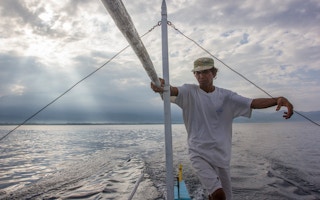Ever since he was a teenager, Filipino fisherman Rony Drio has been sailing into the heart of the South China Sea to fish at the Scarborough Shoal, a large atoll rich in fish stocks that has become one of Asia’s most contested maritime features.
But now, 56-year-old Drio said, it has become increasingly difficult and dangerous to fish at the atoll - some 200 km (124 miles) off the Filipino coast - because of aggressive action by China, which claims the disputed shoal.
Filipino fishermen in San Salvador Island in the Masinloc municipality told Context that China was using speedboats and water cannon to block access to an area that is inside the Philippines exclusive economic zone (EEZ) but was seized by China in 2012.
The skirmishes are taking place as the Philippines steps up its defence posture in the South China Sea, an area long seen as a potential flashpoint between the United States and China.
The high seas drama has slashed the incomes of the fishermen of San Salvador Island. No longer able to fish freely at the atoll, and sometimes chased away before they have even caught anything, they are forced into the open sea.
This costs more in fuel, leading many into a vicious cycle where each trip leaves them more indebted and thus forced to travel further next time to catch more fish.
“
When the sea rumbles, a fisherman’s stomach will also rumble. We want the government to help us so we can fish again for our families without worry
Rony Drio, fisherfolk, Pamalakaya
The fishermen are also no longer able to shelter from storms in the turquoise lagoon of the Scarborough Shoal, making their trips more dangerous.
“We were just trying to make a living but we were driven out. Many of us dread seeing China’s coast guards,” said Drio.
“Everything we have now is debt. If you had a debt from a fishing trip, you need to sail again so you can pay for it and that incurs another debt … It’s a cycle,” he said.
Jimmy Tabat, another fisherman from Masinloc, said three days on the shoal used to yield enough fish to feed fishermen’s families and leave them with some savings.
“Fishing trips inside the shoal consume less fuel and produce more fish than (in) the deeper open sea,” said the 45-year-old.
The Scarborough Shoal is named after a British ship that was grounded here in 1748 but is known to Filipinos as Bajo de Masinloc or Panatag — a Tagalog word for “peaceful”.










